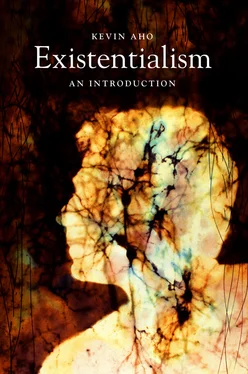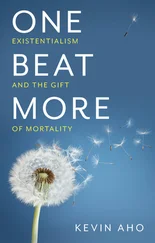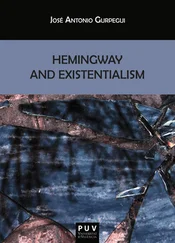Kevin Aho - Existentialism - An Introduction
Здесь есть возможность читать онлайн «Kevin Aho - Existentialism - An Introduction» весь текст электронной книги совершенно бесплатно (целиком полную версию без сокращений). В некоторых случаях можно слушать аудио, скачать через торрент в формате fb2 и присутствует краткое содержание. Год выпуска: 2013, ISBN: 2013, Издательство: Polity, Жанр: Философия, на английском языке. Описание произведения, (предисловие) а так же отзывы посетителей доступны на портале библиотеки ЛибКат.
- Название:Existentialism: An Introduction
- Автор:
- Издательство:Polity
- Жанр:
- Год:2013
- ISBN:978-0745651422
- Рейтинг книги:3 / 5. Голосов: 1
-
Избранное:Добавить в избранное
- Отзывы:
-
Ваша оценка:
- 60
- 1
- 2
- 3
- 4
- 5
Existentialism: An Introduction: краткое содержание, описание и аннотация
Предлагаем к чтению аннотацию, описание, краткое содержание или предисловие (зависит от того, что написал сам автор книги «Existentialism: An Introduction»). Если вы не нашли необходимую информацию о книге — напишите в комментариях, мы постараемся отыскать её.
Existentialism: An Introduction
Existentialism: An Introduction — читать онлайн бесплатно полную книгу (весь текст) целиком
Ниже представлен текст книги, разбитый по страницам. Система сохранения места последней прочитанной страницы, позволяет с удобством читать онлайн бесплатно книгу «Existentialism: An Introduction», без необходимости каждый раз заново искать на чём Вы остановились. Поставьте закладку, и сможете в любой момент перейти на страницу, на которой закончили чтение.
Интервал:
Закладка:
The existentialist account of alienation and self-deception takes a darker turn in Sartre's Being and Nothingness . According to Sartre, I can only become aware of who I am through ‘the look’ ( le regard ) of the Other. The look is a social judgment that defines me as a ‘being-in-itself,’ as an object or thing, and this, in turn, dehumanizes me, stripping me of the possibility of creating and fashioning my own identity. I am, as Sartre writes, “possessed by the Other; the Other's look fashions my body in its nakedness, causes it to be born, sculptures it, produces it as it is, sees it as I shall never see it. The Other holds a secret — the secret of what I am ” (1956, 475, my emphasis). This means that when the Other judges me to be unattractive, cowardly, heroic, or successful, I tend to internalize this judgment and see myself as that kind of thing, as if it were a destiny. Being-with-others, then, becomes a ceaseless conflict, where I struggle to affirm or assert my subjectivity by turning the other into an object, while the other does the same to me. “While I attempt to free myself from the hold of the Other,” says Sartre, “the Other is trying to free himself from mine; while I seek to enslave the Other, the Other seeks to enslave me. … Conflict is the original meaning of being-for-others” (475). Sartre captures this struggle for self-assertion in the famous words of Garcin, a character in his play No Exit , who describes the experience of being-with-others as a living hell: “I'd have never believed it. You remember all we were told about the torture-chambers, the fire and brimstone, the ‘burning marl.’ Old wives’ tales! There's no need for red-hot pokers. Hell is — other people ” (1989, 45, my emphasis).
As we will see in more detail in chapter 7, this struggle is complicated by the fact that we often participate in our own dehumanization, not only because it creates the consoling impression that there is something secure and thing-like about our identities, but also because it prevents us from having to take responsibility for our choices. In short, it keeps us from acknowledging the fact that we are free, self-making beings. Sartre will refer to this kind of self-deception as ‘bad faith’ (mauvaise foi ), and it occurs when we deny “the double property of human being, who is at once a facticity and a transcendence ” (1956, 98). I deceive myself, for instance, when I adopt the persona of a college professor and see myself solely in terms of the professor's peculiar habits. Thus, the fact I am bookish, absent-minded, and self-absorbed is just the way I am , “and society demands that [I] limit myself to [this] function” (102). In this way, I interpret myself as a professor-thing. But, as ‘being-for-itself,’ I am also not a professor because I have the ability to take a stand on these patterns of behavior and choose to do otherwise. Transcendence, then, is the ‘not’ or ‘nothing’ that always underlies my facticity. In bad faith, I usually cling to my socially constructed identity for security and deny the nothingness, the fact that my identity is always incomplete and that I alone am responsible for my existence. I try, in other words, to “hide” in my facticity “in an effort to flee the being which I am” (351). As a result I forget what Sartre calls “the first principle of existentialism,” namely that “man is nothing else but what he makes of himself” (2001, 293).
From this discussion, it appears existentialists offer only a negative account of human relations, one that is mired in conflict, alienation, and self-deception. However, a number of religious existentialists reject the claim that there can be no authentic communion or intimacy between self and other — that a “unity with the Other is … in fact unrealizable” (Sartre 1956, 476) — and suggest that there are deeper possibilities of being-with-others that modern society covers over.Marcel, for example, argues that it is the unique nature of today's technocratic society that compels us to see ourselves as atomistic individuals, where our relations with others are reduced to exercises in manipulation and control. This, in turn, robs us of the primordial experience of intersubjectivity, mutual dependence, and obligation to others. Buber draws on the Hasidic mystical tradition to make a similar claim with his critique of the ‘I–It’ relations that dominate modern society. In this relation, we see ourselves as isolated subjects that are separate from others (Its). This relation conceals a richer experience of community, where human beings encounter each other not as objects for manipulation but as enigmatic and vulnerable subjects to whom we are irrevocably bound in “a living, reciprocal relation” (Buber 1970, 94). Buber calls this experience of mutual vulnerability the ‘I — Thou’ relation: an experience that can shake us out of the alienation and forlornness of modern life. Dostoevsky's novels also reflect the communal values of the Eastern Church, offering powerful critiques of the modern cult of individualism for the sake of a more profound sense of spiritual solidarity, social responsibility, and ‘belongingness’ ( sobernost ) embodied in the close-knit practices of the Russian peasants, practices where “we are all responsible to all and for all” (Dostoevsky 1957, 278–279; see Guignon 1993, xli).
We see, then, that existentialists differ in their assessments of being-with-others, but they are generally in agreement that the conformity and self-deception of everyday life tends to conceal or cover over the struggle for self-creation. To the extent that we conform to the ready-made identities of the public world, we are alienated and inauthentic; we disown ourselves by simply going along with the crowd, never having to face up to the truth about who and what we really are. It is for this reason, as we will see in the proceeding chapters, that the questions of freedom and authenticity become central to the existentialists.
Frankfurt, H. (1971). Freedom of the will and the concept of a person. Journal of philosophy 68 (1): 5–20.
Hatab, L. J. (2012). Nietzsche: selfhood, creativity, and philosophy. In S. Crowell (ed.), The Cambridge companion to existentialism (pp. 137–157). Cambridge: Cambridge University Press.
Hoffman, P. (1983). The human self and the life and death struggle . Gainesville: University Press of Florida.
Taylor, C. (1997). Leading a life. In R. Chang (ed.), Incommensurability, incomparability, and practice reason (pp. 170–183). Cambridge, MA: Harvard University Press.
5: Freedom
The core idea of existentialism
For the existentialists, no idea is more central than freedom. As Kierkegaard puts it, “The most tremendous thing which has been granted to man is choice [and] freedom” (1959, 189). A century later, Sartre will refer to freedom as the defining feature of existentialism. “At heart,” he writes, “what existentialism shows is the connection between the absolute character of [freedom], by virtue of which every man realizes himself” (2001, 303). As we have seen, the existentialist view of freedom implies that there is no pre-given nature or ‘essence’ to human existence because ‘existence precedes essence.’ That is, we make or create our own essence on the basis of our ongoing choices and actions. Who we are is not determined by any underlying trait or characteristic that we are born with. It is, rather, up to the individual to shape his or her own identity by choosing certain projects and taking action in the world. Only after we make these choices do we become someone, a responsible employee, a loving mother, or a caring friend. But these identities are never secure; they are always subject to future choices. I can, after all, always decide to quit my job, leave my family, or abandon my friends. This means that whatever our factical limitations — whether it is our genetic code, our socioeconomic backgrounds, our religious or family history — they do not ultimately determine who we are. We are self-making beings responsible for the meanings we give to things through our own choices, the totality of which make us who we are. This is why Sartre claims that “man is nothing else than a series of undertakings, that he is the sum, the organization, the ensemble of the relationships which make up these undertakings” (300). He offers the example of a coward to make his case. The coward is not the way he is because of his social upbringing or because of his physiological or genetic constitution. The coward, rather, “ makes himself a coward” by means of his actions. It is what he does that defines him, not his “cowardly heart or lungs or brain” (301, my emphasis).
Читать дальшеИнтервал:
Закладка:
Похожие книги на «Existentialism: An Introduction»
Представляем Вашему вниманию похожие книги на «Existentialism: An Introduction» списком для выбора. Мы отобрали схожую по названию и смыслу литературу в надежде предоставить читателям больше вариантов отыскать новые, интересные, ещё непрочитанные произведения.
Обсуждение, отзывы о книге «Existentialism: An Introduction» и просто собственные мнения читателей. Оставьте ваши комментарии, напишите, что Вы думаете о произведении, его смысле или главных героях. Укажите что конкретно понравилось, а что нет, и почему Вы так считаете.












